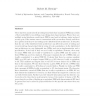Free Online Productivity Tools
i2Speak
i2Symbol
i2OCR
iTex2Img
iWeb2Print
iWeb2Shot
i2Type
iPdf2Split
iPdf2Merge
i2Bopomofo
i2Arabic
i2Style
i2Image
i2PDF
iLatex2Rtf
Sci2ools
146
click to vote
TCS
2010
2010
Canonical finite state machines for distributed systems
There has been much interest in testing from finite state machines (FSMs) as a result of their suitability for modelling or specifying state-based systems. Where there are multiple ports/interfaces a multi-port FSM is used and in testing a tester is placed at each port. If the testers cannot communicate with one another directly and there is no global clock then we are testing in the distributed test architecture. It is known that the use of the distributed test architecture can affect the power of testing and recent work has characterised this in terms of local s-equivalence: in the distributed test architecture we can distinguish two FSMs, such as an implementation and a specification, if and only if they are not locally s-equivalent. However, there may be many FSMs that are locally s-equivalent to a given FSM and the nature of these FSMs has not been explored. This paper examines the set of FSMs that are locally s-equivalent to a given FSM M. It shows that there is a unique smal...
Distributed Test Architecture | Fewest States | State Machine | TCS 2010 | Theoretical Computer Science |
Related Content
| Added | 30 Jan 2011 |
| Updated | 30 Jan 2011 |
| Type | Journal |
| Year | 2010 |
| Where | TCS |
| Authors | Robert M. Hierons |
Comments (0)

